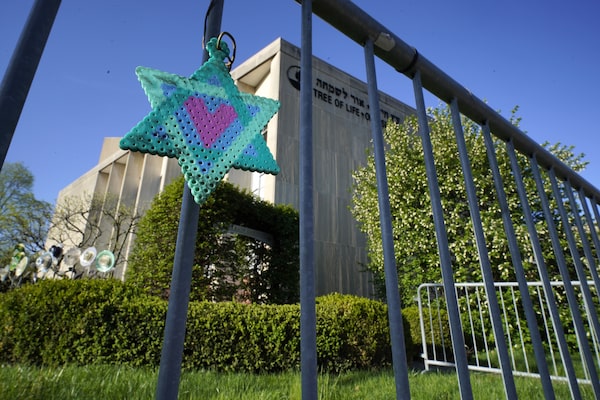
A Star of David hangs from a fence outside the dormant landmark Tree of Life synagogue in Pittsburgh's Squirrel Hill neighbourhood, on April 19.Gene J. Puskar/The Associated Press
A debate for the ages is being conducted in Pittsburgh – and centuries-old theological writings and religious convictions are being analyzed and disputed in modern terms.
In the next several days members of a jury will decide whether Robert Bowers, convicted of slaying 11 Jews in the Tree of Life synagogue five years ago, is eligible for the death penalty. It is likely they will agree that he is – and though this community remains united in grief, it is divided on the next phase of a tortuous judicial process: determining whether he actually should be put to death.
The result is a collection of collisions of sentiment. Many of the families of the victims believe Mr. Bowers should receive capital punishment – but some do not. Many Jews here believe that their apprehension about the death penalty should be shelved in a case in which their own people were slaughtered at prayer – but some say moral consistency is itself a Jewish value.
“There’s a real division here,” said Daniel Fellman, the senior rabbi at Temple Sinai, less than a kilometre from Tree of Life. “The geographical closeness of this case makes this different, and the particular facts of this case – that this was not a random event, that it was premeditated – makes this even more difficult. The question for months here has been what will constitute a ‘win’ in this.”
By a “win,” the rabbi was speaking of how rarely in history perpetrators of anti-Semitic incidents have been successfully prosecuted. “The number of incidents where anti-Semitic crimes have been pursued by the authorities anywhere is very small, compared to the number of times when Jews have been victims of hate crimes,” he said.
Seven of the nine families of the victims told the Justice Department in a letter two years ago that a resolution short of the death penalty “would be a grave injustice as well as a disservice to the lives, legacies and memories of our deceased family members and to us, the immediate victim-family members that live this nightmare each and every day.”
The families of Jerry Rabinowitz and Irving Younger did not sign the letter. Dr. Rabinowitz was known to be an ardent opponent of the death penalty.
Bruce Herschlag, the president of Dor Hadash Congregation, one of three congregations in the Tree of Life building, and Rabbi Jonathan Perlman, wounded in the attack on the building that also houses his New Light Congregation, have asked the Justice Department not to pursue the death penalty.
“We are desirous of seeing justice meted out in a manner that is both consistent with our religious values and that spares us from the painful ordeal of prolonged legal manoeuvring” that might follow, Mr. Herschlag wrote the Justice Department.
Though the Torah includes several circumstances, mostly extreme cases, in which the death penalty might be considered, Jewish law and tradition lean heavily against actually carrying out the death penalty. Talmudic law stipulates that a court that orders an execution more than once in seven years is considered “destructive.”
One of the arguments for the death penalty is rooted in the Book of Exodus passage best known for calling for “eye for eye, tooth for tooth, hand for hand, foot for foot.” But even that does not provide clear guidance.
“The ‘eye-for-an-eye’ argument is that you punish the crime and not the criminal,” said Susannah Heschel, who teaches religious studies at Dartmouth College and is the daughter of the late Rabbi Abraham Joshua Heschel, perhaps the most influential Jewish theologian of the 20th century. “In terms of rabbinic law, you just don’t kill people. You don’t. People who want revenge often support the death penalty, but revenge doesn’t accomplish anything. The desire for revenge is an emotion. That does not help coping with trauma and anger.”
Poll data offer mixed clues to Jews’ sentiments. The Jewish Chronicle, a Pittsburgh publication, conducted an unscientific internet survey this spring, just before the beginning of the Tree of Life trial, that showed more than half the respondents said the death penalty should not be abolished. A 2014 poll by the Public Religion Research Institute showed that only a third of American Jews preferred the death penalty to life in prison. A 2016 Gallup survey found that American Jews (54 per cent) support the death penalty less than do Catholics (61 per cent) and Protestants (66 per cent).
“The fact that Jews were murdered in this case is irrelevant, legally and even theologically, to the traditional Jewish view on the death penalty,” said Bruce Ledewitz, a law professor at Pittsburgh’s Duquesne University and co-author of a 1993 study of Jewish law and the death penalty that was published in the University of Florida Journal of Law & Public Policy. “But emotionally, which is outside the law, it is not irrelevant.”
 David Shribman
David Shribman